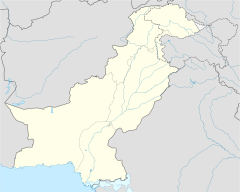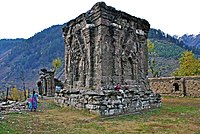Lava Temple
| Lava Temple of Lahore | |
|---|---|
 A view of the temple’s dome from the walls of the Lahore Fort | |
| Religion | |
| Affiliation | Hinduism |
| Deity | Lava (Ramayana) |
| Governing body | Pakistan Hindu Council |
| Location | |
| Location | Lahore, Punjab
Pakistan |
 Shown within Pakistan | |
| Geographic coordinates | 31°35′18″N 74°18′46.4″E / 31.58833°N 74.312889°ECoordinates: 31°35′18″N 74°18′46.4″E / 31.58833°N 74.312889°E |
| Architecture | |
| Type | Hindu temple |
| Temple(s) | 1 |
| Website | |
| http://www.pakistanhinducouncil.org/ | |
Lava Temple (Urdu: لو مندر) is a Hindu place of worship dedicated to the Hindu deity Lava, the son of Rama. It is in Lahore Fort, Lahore, Pakistan, and dates to the Sikh period.[1] According to a Hindu legend,[2] Lahore is named after him.[3]
Etymology[]

In the Deshwa Bhaga, Lahore is called 'Lavpor', which points to its origin from Lav, the son of Rama. In the ancient annals of Rajputana, the name given is 'Loh Kot', meaning “the fort of Loh” which, again, has reference to its founder, Rama's son.[4]
History[]
A legend based on oral traditions holds that 'Lahore', known in ancient times as 'Lavapuri' (City of Lava in Sanskrit),[5] was founded by Prince Lava,[6] the son of Sita and Rama. Kasur was founded by his twin brother Prince Kusha.[7]
To this day, Lahore Fort has a vacant temple dedicated to Lava (also pronounced Loh, hence Loh-awar or "The Fort of Loh").[8]
Management[]
Currently this temple is under the control of Pakistan Government and is managed by the Pakistan Hindu Council.
See also[]
- Hinduism in Pakistan
- Evacuee Trust Property Board
- Pakistan Hindu Council
- Krishna Mandir, Lahore
- Valmiki Mandir, Lahore
- Temples in Lahore
References[]
- ^ Zamir, Sufia (2018-01-14). "HERITAGE: THE LONELY LITTLE TEMPLE". DAWN.COM. Retrieved 2020-04-27.
- ^ Khalid, Haroon (2018-12-31). "How old is Lahore? The clues lie in a blend of historical fact and expedient legend". DAWN.COM. Retrieved 2020-01-11.
- ^ Annual Bibliography of Indian History and Indology. 1946.
- ^ History of Lahore
- ^ Bombay Historical Society (1946). Annual bibliography of Indian history and Indology, Volume 4. p. 257. Retrieved 2009-05-29.
- ^ Baqir, Muhammad (1985). Lahore, past and present. B.R. Pub. Corp. pp. 19–20. Retrieved 2009-05-29.
- ^ Nadiem, Ihsan N (2005). Punjab: land, history, people. Al-Faisal Nashran. p. 111. ISBN 9789695034347. Retrieved 2009-05-29.
- ^ Naqoosh, Lahore Number 1976
- Hindu temples in Lahore
- Shrines in Lahore
- 2006 in Pakistan
- Political history of Pakistan
- Reports of the Government of Pakistan
- History of Lahore (1947–present)

